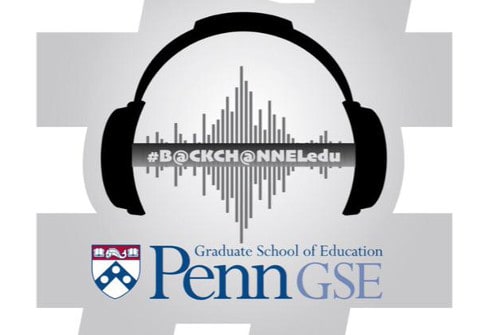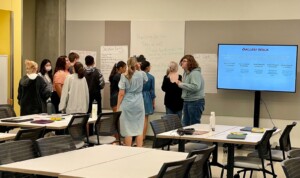Inspired by Serial: Behind MCDPEL’s New Podcast for EdLeaders

Joe Mazza
A little over a year ago, a few educational leaders made up of elementary, middle and high school principals and superintendents began an online conversation through our cell phones using the Voxer app. Voxer is a simple, two-way, asynchronous walkie talkie app has become popular in the education space.
Our group has been feeling limited by Twitter’s 140 characters limit on tweets and Direct Messages, so using Voxer to complement the fastest growing social media (Twitter) is a no brainer to more and more educators in 2015. The idea for our podcast came directly from the group of school leaders I’ve been “voxing” with over the past year after a few of us listened to the “Serial” podcast, a 12-part murder mystery podcast based on a 1999 after-school murder mystery in Baltimore, MD. This podcast as well as the voxer group, inspired the idea to create a podcast on real issues for real school leaders. This work also led to the birth of a new #eduvoxers hashtag and Twitter handle (@eduvoxers) that is aimed to support educators looking to “backchannel” their conversations asynchronously around curriculum, pedagogy, BYOD, family and community engagement, edcamps or many other topics that ed leaders face in today’s field. [RESOURCE: @MCDPEL Innovations Lab Eduvoxers Page]
Each day, I open the Voxer app on my commute to/from campus, while walking the dog, running on the treadmill or even waiting in line at the store or doctor’s office. This is my chance to listen and contribute to my own personalized podcast using Voxer. We feel more comfortable being ourselves even with all of our own quirks and flaws in small private group messages, so the comedy that naturally arises from some of education’s most innovative minds each day is just what many of us in the field need emotionally. The truth is we need more opportunities to be ourselves. Life happens. School happens. I’ve learned that leadership isn’t something that we can script out like Grandma Hayknee’s famous pre-prepared Snickerdoodles that comes out perfect every time. There are always variables, perspectives, histories and cultures that the very best relationship-based leaders always find a way to embed into their own understanding of the situation before making a rash decision.
Question
How can educational leaders take advantage of social media to support each other through challenging situations arising daily in a profession where we’ve added so much to the “plate” that many of us actually go back and get a second plate (what we’ll refer to as working nights and weekends while limiting family time which leads to burnout and troubled relationships with family and friends)?
As educators we’re not getting any more time put back into our days. One thing we don’t do well as a field is maximize the time we do have. This is an area that we are working really hard to innovate at @MCDPEL because you can have great strategies and execution, but if you can’t manage your time as a leader you won’t be able to maximize the potential of your efforts.
Our innovative, three-year executive-style educational leadership program is working to not only embed social media and future-ready initiatives into the daily work with students, faculty, and alumni, but use media that not only are mainstream in the real world today, but also user-friendly and helps us maximize that precious time for leaders who have never been busier in their evolving roles: Enter @MCDPEL’s new BACKCHANNELedu podcast for educational leaders. Airing on Mondays, the MCDPEL Innovations Lab posts a short educational leadership scenario in podcast form (shared via our Twitter, Facebook, LinkedIn, Google+ channels and email subscription). Each narrative is drafted by a real educational leader working in the field. Most stories use “guest voices” from the field, but some leaders choose to share their challenge with full transparency. Regardless of who is sharing their “challenge,” real leaders in the field can now benefit from “the backchannel” of perspectives that discuss real challenges for today’s educational leaders. At some point during the podcast around the 10-15 minute mark, the leadership scenario ends abruptly. Listeners being provided an opportunity to continue to “backchannel” potential next steps using social media (Follow on Twitter @BACKCHANNELedu and participate using the hashtag #BACKCHANNELedu).
This #backchannelEDU hashtag is populated throughout the week until the next episode is released on the following Monday. Participants are encouraged to share the scenario locally and globally as a means of crowdsourcing solutions across a variety of unique perspectives. A concerted effort to connect research to practice using research studies are infused into episodes and conversation where applicable. Links to studies and other reflective and relevant practitioner blogposts will be included on weekly Google Docs to support further discussion during that week or sometime down the line. It’s not important whether leaders are using the weekly topics to respond during the week on social media or at a different time convenient for the leadership team. Leaders might also innovate here and infuse an #eduvoxers grade level team, all-faculty, all-committee or all district group to tackle the scenario asynchronously. Also, several grad school professors have begun implementing these scenarios as part of their leadership program in a “flipped classroom” strategy: Listen to the scenario on your ride to class. Be prepared to discuss it and take the lens of the leader.
How Are Topics Chosen?
Back in the fall, a team from the National Association of Elementary School Principals (@NAESP) and @MCDPEL developed a list of topics suggested by school principals as “topics that could use support.”
- Student/staff bullying (TBA)
- Building operations and maintenance (TBA)
- Evacuation and crisis management (Episode 01)
- Student mental health (TBA)
- School violence (TBA)
- Teacher leadership/Professional development (Episode 04)
- 21st Century Learning (TBA)
- Family & community engagement (Episode 06)
- School culture/Digital citizenship (Episode 02)
- Supporting New Principals (Episode 07)
- English Language Learners (Episode 05)
- Infusing Conference Learning (Episode 03)
- Lightning Round from #NASSP15 Conference: Social Media Tools for #EdLeaders (Bonus track)
*This series includes twelve episodes, will Season 1’s final episode airing May 26, 2015.
Confidentiality
Each new leadership scenario comes directly from those working in the field. We encourage the use of names for certain situations, but will use fictitious identities when appropriate to avoid sharing identifying information the leader or anyone within the leader’s learning community.
Listeners Climbing
Listen to the latest #B@CKCH@NNELedu Episode here. After week 6, Stitcher ranked it the 29th most listened to education podcast in the world.
Submit Your Own Leadership Scenario
This is what it’s all about – spreading the seamless collaborative potential of social media for today’s busy educational leaders. You, your leadership team and/or your education hashtag chat are encouraged to follow this link to author a real leadership challenge for an upcoming #B@CKCH@NNELedu episode. Season 2 topics will be announced this summer after polling the field for new and challenging ed leadership challenges. We’ll be in touch if your scenario is selected, so we can work through the details together prior to signing our PennGSE clearance form.
This post is part of our “Preparing Leaders for Deeper Learning” series. If you have thoughts about what today’s school leaders should know and be able to do and how they should be prepared, we’d love to hear from you. Contact [email protected] with the subject “Preparing Leaders” for more information.
To learn more, see:
- 5 Steps to Effective and Transformative Professional Development
- Whose Role is it Anyway?
- EdLeaders for the 21st Century

Dr. Joe Mazza serves as the Leadership Innovation Manager at the University of Pennsylvania’s Graduate School of Education. Follow him on Twitter @Joe_Mazza.




0 Comments
Leave a Comment
Your email address will not be published. All fields are required.